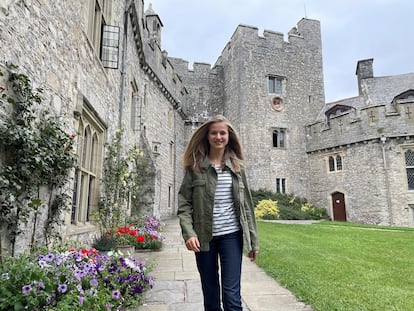Spain’s Princess Leonor begins studies in Wales
The heir to the Spanish throne will by studying alongside Princess Alexia of the Netherlands as she completes her two-year International Baccalaureate program, which costs €76,000

Princess Leonor de Borbón y Ortiz, the elder daughter of King Felipe VI and Queen Letizia, and heir presumptive to the throne of Spain, traveled on Monday to Wales to begin a two-year International Baccalaureate program with the United World College (UWC) education movement at UWC Atlantic College.
The Royal Household released images of Princess Leonor’s emotional farewell at Madrid-Barajas airport, showing the 15-year-old hugging her parents and younger sister, the infanta Sofía. The princess is fully vaccinated against Covid-19, meaning she will not have to quarantine upon her arrival at UWC Atlantic College, which is located in the Vale of Glamorgan. She will, however, have to take a PCR test on her second day in the United Kingdom, as is currently required by the British authorities.
UWC Atlantic College is an exclusive academic establishment that is favored by aristocrats, millionaires and intellectual bohemians. It was described three years ago in the British daily The Times as “Hogwarts for hippies,” in reference to the magic school in the famous Harry Potter books. The college is located on the grounds of St Donat’s Castle, a medieval castle that was remodeled after it was bought by US media tycoon William Randolph Hearst in 1925. Playwright George Bernard Shaw described the 12th-century castle as “what God would have built if he had the money.”
Princess Leonor, who arrived at UWC Atlantic College on Monday, will be studying alongside 350 students from 90 nationalities. At least half of the students are on scholarships and receive financial aid from private benefactors, or have the cost of their studies covered in part by the income raised by fee-paying students. A total of 5% of the students at the school are refugees from conflict zones such as Palestine, Yemen, Iraq and Afghanistan.
In the case of Princess Leonor – who passed the strict admission exams anonymously, according to the head of the college – the cost of the two-year International Baccalaureate program is €76,000, which will come out of the annual provision the state sets aside for the royal family, according to sources from La Zarzuela, the seat of the royal household.

Princess Leonor will share a room with three other students and her day will begin at 8am. At 6pm dinner is served and by 9.30pm, all students must be in their rooms. Princess Leonor will also be studying alongside Princess Alexia of the Netherlands, who is the second in the line of succession to the Dutch throne.
UWC Atlantic College was founded by German pedagogue Kurt Hanan, who also set up Gordonstoun School in Scotland, where the late Prince Phillip and Prince Charles, the heir to the British throne, completed part of their studies. The current president of the school is Queen Noor of Jordan, and Nobel laureate Nelson Mandela was once an honorary president of the school. According to the college’s founding statute, its mission “is to make education a force to unite people, nations and cultures for peace and a sustainable future.”
According to the Royal Household, Princess Leonor, who will turn 16 in October, will maintain her public commitments as heir to the Spanish throne, but has not detailed how she will balance these duties with her rigorous academic schedule, which also includes community service, physical activity and creative workshops.
English version by Melissa Kitson.
Tu suscripción se está usando en otro dispositivo
¿Quieres añadir otro usuario a tu suscripción?
Si continúas leyendo en este dispositivo, no se podrá leer en el otro.
FlechaTu suscripción se está usando en otro dispositivo y solo puedes acceder a EL PAÍS desde un dispositivo a la vez.
Si quieres compartir tu cuenta, cambia tu suscripción a la modalidad Premium, así podrás añadir otro usuario. Cada uno accederá con su propia cuenta de email, lo que os permitirá personalizar vuestra experiencia en EL PAÍS.
¿Tienes una suscripción de empresa? Accede aquí para contratar más cuentas.
En el caso de no saber quién está usando tu cuenta, te recomendamos cambiar tu contraseña aquí.
Si decides continuar compartiendo tu cuenta, este mensaje se mostrará en tu dispositivo y en el de la otra persona que está usando tu cuenta de forma indefinida, afectando a tu experiencia de lectura. Puedes consultar aquí los términos y condiciones de la suscripción digital.









































